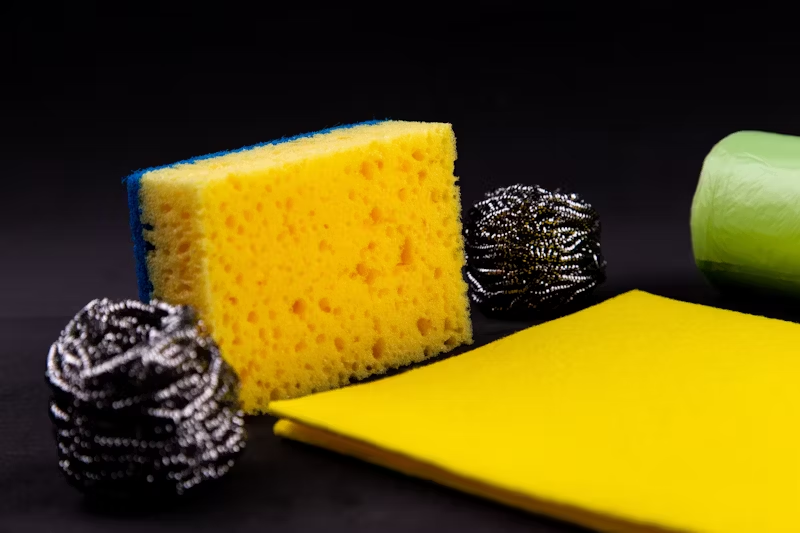Your kitchen sponge might seem like an innocent cleaning tool, but lurking within its porous structure is a world of harmful bacteria that could be putting your health at serious risk. This everyday household item, often used for scrubbing dishes and wiping surfaces, is a breeding ground for germs. Let’s explore the shocking ways your kitchen sponge could be endangering your health and what you can do to minimize these risks.
1. Sponges Are Bacterial Breeding Grounds
Did you know your kitchen sponge is one of the dirtiest items in your home? Research shows that it harbors more bacteria than even your toilet seat. The combination of food residue, moisture, and a lack of airflow makes sponges the ideal environment for harmful microbes like Salmonella and E. coli.

- Alarming Numbers: A single sponge can house billions of bacteria—more than the human population on Earth.
- Health Risks: These bacteria can cause foodborne illnesses, leading to symptoms like diarrhea, vomiting, and abdominal pain.
2. Common Cleaning Methods Aren’t Enough
Think microwaving or boiling your sponge will make it germ-free? Think again. While these methods can reduce bacteria, they don’t eliminate all of them. In fact, they can sometimes make the problem worse.
- Superbacteria Alert: Studies reveal that cleaning sponges can kill weaker bacteria, leaving behind hardier, more resistant strains.
- Quick Regrowth: These resilient microbes recolonize the sponge rapidly, making your cleaning efforts almost futile.
3. Sponges Spread Bacteria Across Your Kitchen
Every time you use your sponge, you might be spreading harmful bacteria instead of cleaning. When you scrub surfaces, utensils, or dishes with a contaminated sponge, you transfer germs to these areas, creating a cycle of contamination.
- Cross-Contamination: Germs from raw food, dirty dishes, or countertops can easily travel from your sponge to your hands and onto other surfaces.
- Invisible Threats: Even a sponge that looks clean can harbor bacteria that pose a risk to your health.
4. Sponges Rarely Dry Out
Unlike kitchen brushes or cleaning cloths, sponges stay damp for extended periods. This retained moisture provides an ideal habitat for bacteria to thrive and multiply.
- Moisture Problem: Even when stored properly, most sponges never dry completely between uses.
- Bacterial Growth: The constant dampness accelerates bacterial reproduction, turning your sponge into a germ factory.
5. Foul Odors Signal Dangerous Bacteria
Does your kitchen sponge have an unpleasant, musty smell? That odor is a warning sign of bacterial contamination. Harmful microbes like Moraxella osloensis, known for its foul-smelling traits, could be the culprit.
- What the Smell Means: These bacteria can cause infections, particularly in individuals with weakened immune systems.
- Immediate Action: If your sponge smells bad, it’s time to toss it out and replace it.

Credit: Unsplash
6. Your Sponge May Harbor Fecal-Like Bacteria
Shocking but true: A study found that a single cubic centimeter of a kitchen sponge can contain as many bacteria as are found in feces. This startling discovery underscores the potential health hazards of using sponges without proper care.
- A Dirty Reality: Your sponge might be dirtier than your toilet if not replaced regularly.
- Serious Implications: The bacteria in sponges can cause illnesses ranging from mild stomach upsets to severe infections.
7. Using Sponges with Raw Meat Is a Recipe for Disaster

Credit: Unsplash
Cleaning up after handling raw meat with a sponge is a common mistake that can lead to dangerous contamination. Sponges easily absorb the juices from raw poultry or other meats, which often contain harmful bacteria like Campylobacter and Salmonella.
- Expert Advice: Avoid using sponges for raw meat cleanup. Instead, opt for disposable cleaning wipes or paper towels.
- Risk Reduction: This simple change can significantly lower the chances of spreading harmful bacteria in your kitchen.
8. Old Sponges Are Even Worse
The longer you keep a sponge, the more bacteria it accumulates. Over time, even diligent cleaning efforts can’t keep up with the rapid growth of microbes in an aging sponge.
- When to Replace: Experts recommend replacing kitchen sponges every one to two weeks.
- Warning Signs: If your sponge looks worn, smells bad, or feels slimy, it’s time to throw it away.
How to Reduce Sponge-Related Health Risks

While kitchen sponges are undeniably convenient, their health risks can’t be ignored. Here’s how to minimize these dangers and keep your kitchen cleaner:
- Replace Frequently: Swap out your sponge every one to two weeks to limit bacterial buildup.
- Opt for Alternatives: Consider using brushes or dishcloths, which dry faster and harbor fewer bacteria.
- Avoid Certain Tasks: Don’t use sponges for raw meat cleanup or wiping up spills involving high-risk foods.
- Disinfect Regularly: If you choose to clean your sponge, soak it in bleach or vinegar, as these methods are more effective than microwaving.
- Store Properly: Keep your sponge in a well-ventilated spot to help it dry between uses.
Conclusion: Small Tool, Big Risk
Your kitchen sponge might seem harmless, but it could be one of the biggest health risks in your home. From spreading bacteria to harboring germs similar to those found in feces, its dangers are often underestimated. By replacing sponges regularly, avoiding their use with raw meat, and considering more hygienic cleaning tools, you can protect your health and maintain a safer kitchen environment.





